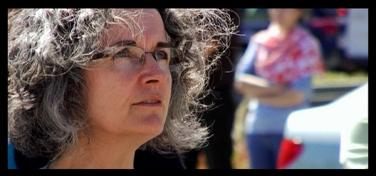
Our days, absolutely, have to be enlightened, France, 2012, 22'
"Prison is not a place that you go through. It is a closed space, out of sight and out of mind of the city. And yet, this space opened slightly for a moment under the summer sun. The song of the inmates resounded from inside the prison and a link was formed between them and the people outside. The voices then faded away, but they had been roused and that is enough.
That has all now disappeared. Only some images, some sounds, some memories remain. The audience has dispersed. The inmates have scattered, beyond our lives, invisible in prison or have returned to their anonymous lives outside. We will never know what affect this project has had on them. Nor will we ever know what affect this project has had on us… If that is not the pure emotion of the encounter, it is what happens when what separates us disappears, when our mere human condition brings us together.
Several years ago, I went to present one of my films at this Orléans jail. The experience really affected me.
First of all, you have to enter and slowly go through, one after the other, the doors that progressively separate the visitor from the outside. The large nave, the rows of cells doors, the inmates and wardens moving around… Recalling films and books, but also the stereotypes of prison do not mean that you really know what it is about. However, nothing can prepare you for the overwhelmingness you feel when you enter there for the first time.
Then, there is the meeting with the inmates. What hits you as soon as you see them: their way of standing, speaking, dressing… Everything points to where they come from. The reality of this lumpenproletariat excluded from our civilised societies takes shape.
Finally, the feeling of uselessness of being there to show a film, the feeling of a resentful clear conscience, but also this certainty that creating the possible in prison may happen if sufficient time is spent there, that precise need to return there.
When Mixar invited me to create a work in situ in Orléans, the only place I saw as the obvious scenario was the jail. And rapidly the desire to create a link between those people inside and those outside took over, quickly followed by the idea of a concert by the inmates for an audience come to hear them from outside: the simplicity of song as a means to create the link, sharing, its capacity to integrate in us and between us.
Interviewed by France 3, one of the inmates said that what she loved about this project was the possibility to “show ourselves as something other than monsters”. Only voice, beyond these clichéd images of prisoners that we all have: the dangerous convict before being ostracized or the prisoner victim of the injustice of established justice. Only the voices of human beings are capable of transmitting emotion, fragility, beauty. Grace.
I am not a believer in sweeping statements of intent regarding art, or rather, culture, as a means of creating the possible, sharing, meaning, of making life richer. Culture is always possibly a tool of domination and at best it barely alleviates the damage. However, there, in prison, for the first time, I felt that going there to work with the inmates had a point: that of pleasure. It is just a short time ago that the inmates took pleasure in singing and in reaching out to the ones they love outside, but it is already a great deal.
This falling short of politics is exactly where this project has taken on a meaning, it is precisely in that falling short where politics intervenes, politics as a specific action. Art that allows you to escape from the hardness of reality for a time and not that art that is satisfied with denouncing, even though it will always need to do so. Art which is committed to the real. An art aware of human vulnerability. Art which defines its subjects as humans and no longer as victims. A modest, poor, ephemeral art, which above all places us in the world as fragile beings.
The concert took place.
And we very quickly felt the need to leave a record of what we had experience during that project. Any attempt at archiving, of broadcasting those moments necessarily has gaps and always lacks the force of the real and being live. Yet we wanted the voices of those people to be heard once again, even those that are hidden from us, but which are no monsters, to make the song be heard of those absent beings who are however just like us. Once again, before the gap in the wall of the Orléans jail is closed again, for some time."
Jean-Gabriel Périot
Jean-Gabriel Périot: "Prison is not a place that you go through. It is a closed space, out of sight and out of mind of the city."
